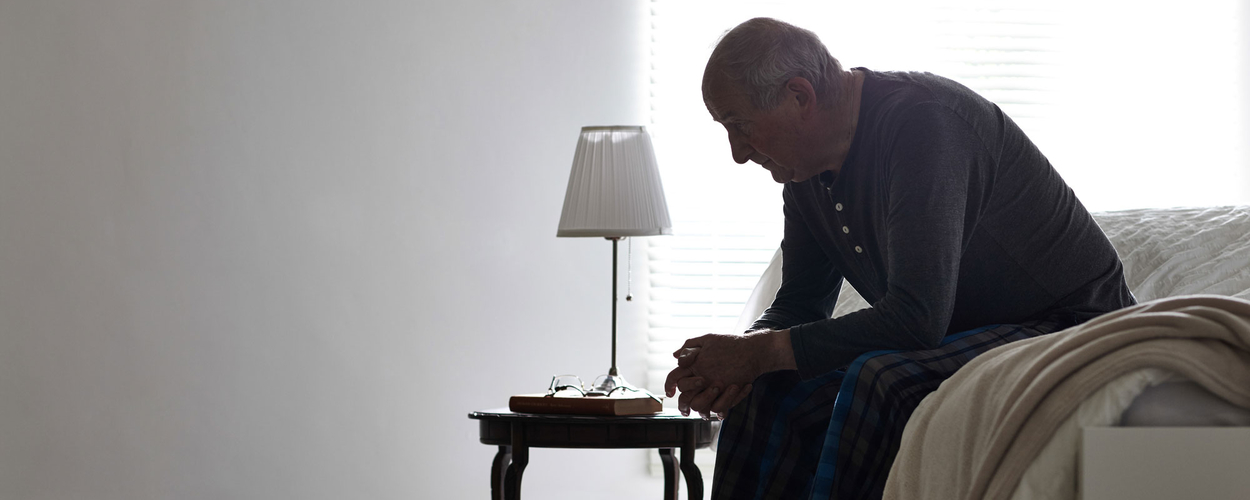Today, our understanding of mental health is better than ever. But are older people being left behind? Depression in older people can sometimes be brushed off as a natural part of growing older. It shouldn't be this way. If depression goes untreated, it can cause a serious decline in an older person's physical and mental health. Today's article aims to help you recognise depression in older people. If you notice any signs or symptoms that you or someone you know may be suffering from depression, now is the time to act.
The Facts About Depression:
-
- 68% of adults over 65 report knowing ‘little or nothing’ about depression.
-
- Only 38% of adults over 65 believe depression is a health problem.
-
- Older people are less likely than any other age group to seek medical help for depression – only 42% said they would pursue a healthcare professional.
-
- Over-65s are almost 50% less likely to recognise signs of depression than those who haven’t reached pensionable age.
-
- 58% of people aged over 65 believe that depression is a ‘normal’ part of growing older.
Why Is Depression in Older People Overlooked?
There are many reasons why people may not notice the signs of depression in older people.
Firstly, many elderly people have physical complaints, which we rarely associate with depression. However, research has proven that the symptoms of depression can exacerbate existing physical problems.
In addition, older people often become isolated as their social circle diminishes. Many also face issues with transportation which can make it even more difficult to socialise. These issues can fuel feelings of depression and loneliness.
Unfortunately, many elderly people may be reluctant to talk about feelings of depression. As a result, they may not ask for help and their overall health can suffer as a consequence. This is why it is so important for everyone to practise honest, open communication with their loved ones. Opening up sooner rather than later undeniably makes a difference.
It is vital to be able to spot the signs of depression in older people. Next, we're going to take a look at some of the main symptoms.
Signs of Depression in Older People:
It is first important to note that depression can take different forms in different people. No two individuals will have identical experiences. Nonetheless, the symptoms below are reliable indicators that someone may be suffering. Look out for:
- Feelings of sadness
- Unexplained aches and pains
- Little or no interest in socialising
- Loss of appetite
- Erratic sleeping patterns
- Loss of self-esteem
- Frequent use of alcohol or drugs
- Problems with speech or memory
- Disregard for personal care
- Suicidal thoughts or comments
Depression and Physical Health:
Depression does not just affect mental wellbeing. It can also have a serious impact on physical health. Recently, studies have shown that depression is more common among people living with certain physical illnesses, for instance:
- Parkinson’s disease
- Stroke
- Heart disease
- Cancer
- Diabetes
- Dementia and Alzheimer’s disease
- Lupus
- Multiple Sclerosis
Depression vs. Dementia: The Key Differences
Sometimes, the signs of depression in older people can be misidentified. Dementia is an unrelated illness with similar symptoms. Here are some key differences to look out for:
Depression
- Mental decline happens quite rapidly
- The person is fully aware of their environment
- The person can have difficulty concentrating on the present
- The person's communication skills may be slower than usual but never severely diminished
- If the person is experiencing memory problems, they are likely to be very worried about them
Dementia
- Mental decline occurs gradually
- The person is often confused and may have little or no awareness of their environment
- The person may have difficulty with short-term memory
- The person's writing, speaking, and/or motor skills may be severely diminished
- The person may not be aware of their short-term memory problems; they may not be overly concerned
What Can Older People Do to Curb Depression?
Luckily, there are lots of things that older people can do to combat depression.
Our first tip is to look for a social group or join a club. The internet is a great tool for finding organisations nearby. Regular social contact combats isolation and reduces stress.
Secondly, invite family and friends over. Try and find time to meet up with loved ones as regularly as you can. Alternatively, have regular catch-ups over phone or via email. As technology develops, it is easier than ever to keep in touch with loved ones. Why not try reconnecting with old friends on social media?
Depression can decrease one's motivation to go out. Sufferers should fight this urge and get fresh air as frequently as possible. Volunteering for a cause you care about is a great way to get out and about while making a positive contribution to society. What's more, volunteering has been proven to combat depression by fostering connections and improving self-esteem.
Finally, try focusing on a new or existing hobby. Board games, gardening, and reading are ever-popular options. Similarly, activities like jigsaw puzzles which occupy both the mind and the body are especially useful. You could also try learning a new skill or even a foreign language. With sustained effort, a hobby can offer a wonderful sense of accomplishment and progress to an older person.
Healthy Habits:
It is important for older people to maintain healthy habits in order to support a healthy mind. This can sometimes feel like a struggle, but it is vital to good physical and mental health.
Mild exercise every day, even a very short walk, will certainly make a profound difference. It's important to stay active as you get older.
People of all ages should try to avoid lots of sugary foods. While these might give a short-term mood boost, they will cause you to crash later. Instead, aim for lots of proteins, carbs and healthy fats. These will keep blood sugar levels at an even keel. Check out our guide to healthy eating for more information.
Aim to get 8 hours of sleep each night. It is important to try to maintain a regular routine.
Finally, try to avoid drinking excessive amounts of alcohol. Of course, there is nothing wrong with a drink in moderation. On the other hand, we should note that alcohol is a depressant. If you are already feeling low, alcohol will only compound your symptoms.
How to Help:
Overall, it is easy to feel powerless in the face of mental illness. However, there are several ways you can help a loved one who is suffering.
If someone you know is experiencing prolonged low moods, you should firstly encourage them to seek help from their GP.
Then, if you can, invite the person to spend time with you. Perhaps you could invite them over for a meal or take them out for a coffee.
Try to find an activity that your loved can enjoy regularly. Libraries, community centres, and social clubs for instance offer a variety of events for older people. Having something to look forward to can bring structure and motivation to an older person's routine.
Your loved one may be unable to cook for themselves. In this case, you should help them prepare healthy meals whenever you can.
Above all, be highly vigilant of suicidal behaviour. Important warning signs include: giving away treasured possessions, increased alcohol consumption, and expressions of hopelessness. Do not dismiss any comments or signs as unimportant.
Most important of all: be there for them. Listen to them. If possible, try to talk them through their problems. These simple offers of support can often mean the world to someone who is struggling.
If you are worried that your loved one may be struggling to live independently, a Careline Alarm could be the solution. See our helpful guide for more information or call 0800 030 8777 to speak to a member of the team.
Editor's Note: This article was updated on 14th July 2023 to reflect current information.
Choose Your Personal Alarm
To help you choose, start by selecting where you would use your personal alarm. In home only or at home and on the go.













Leave a Reply